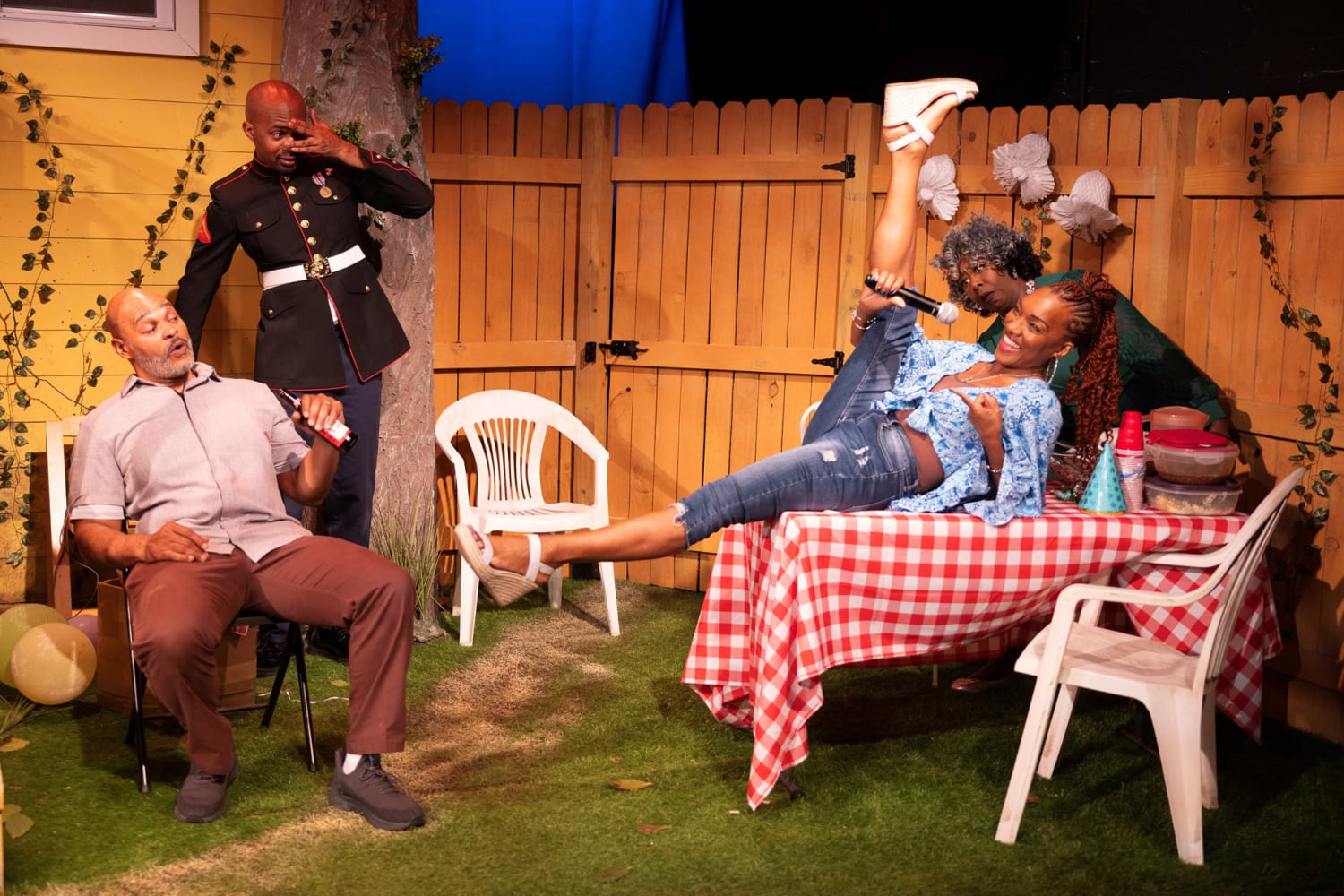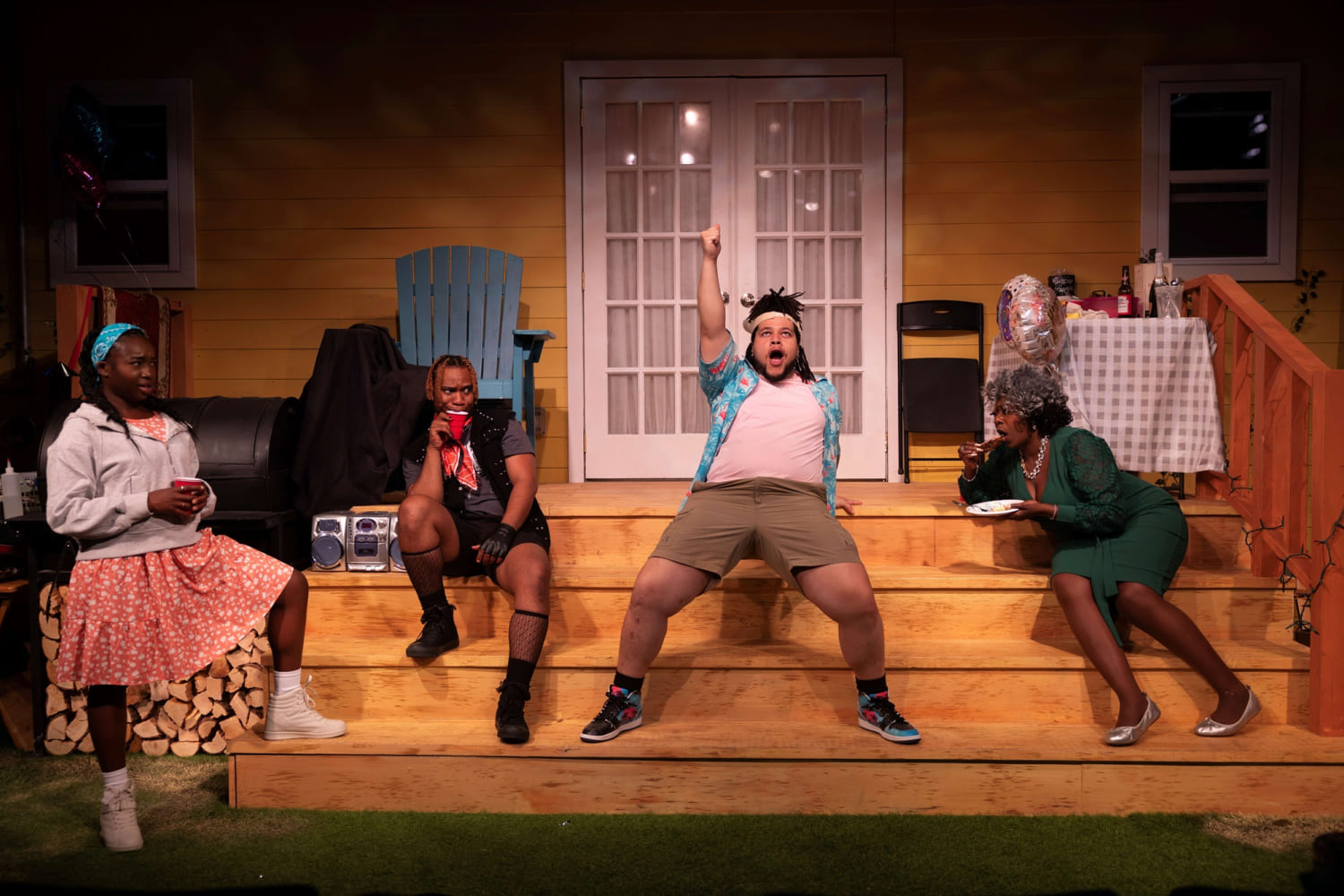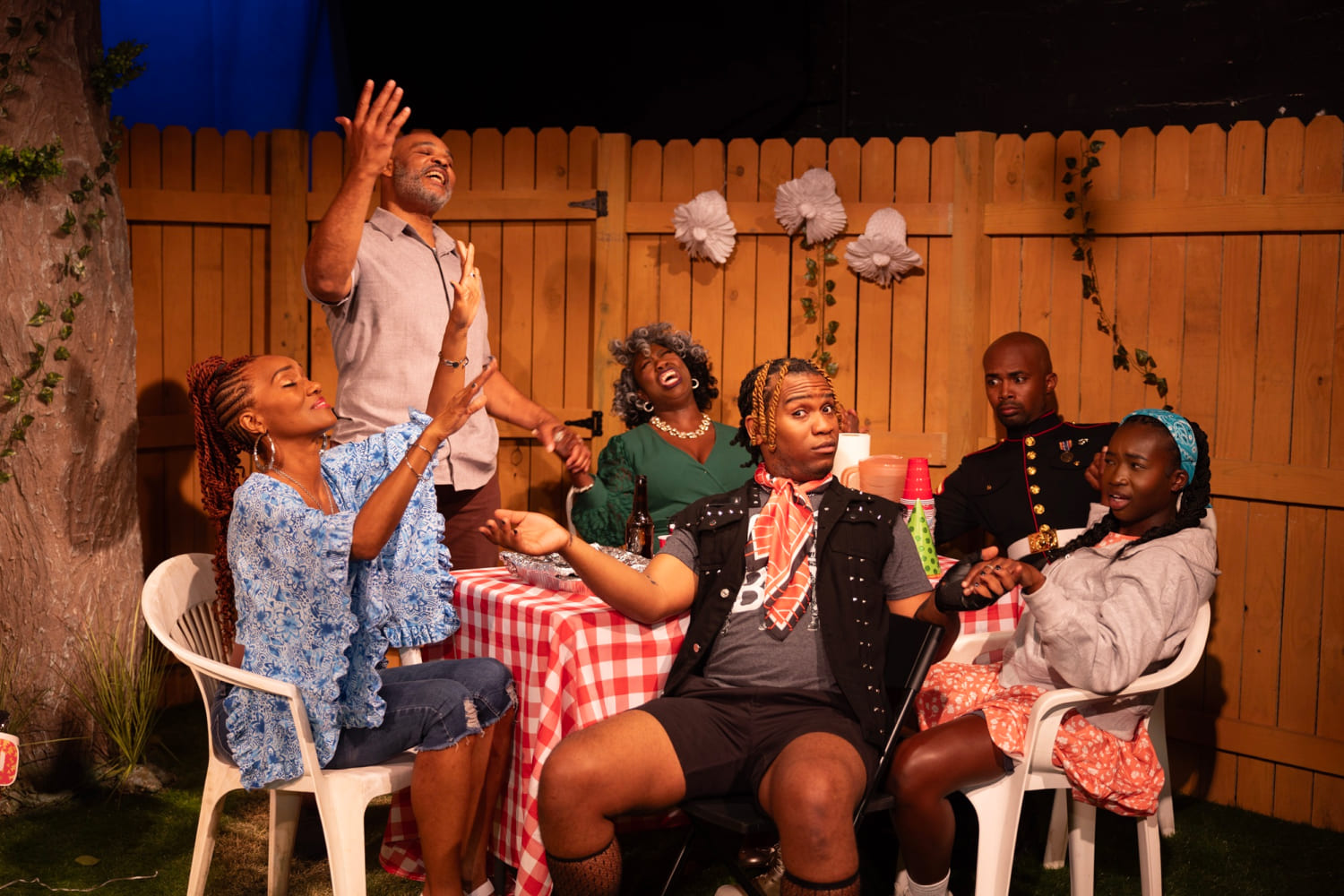
From left, Rev (Melvin Huffnagle), Larry (Denzel McCausland), Rabby (Toddra Brunson) and Opal (Cassidy Joseph) in "Fat Ham." (Photo by Matthew Tippins)
Confetti falls at the end of a fantastic South Florida three-way co-production of James Ijames's juicy and raucous, yet tender Pulitzer-Prize winning comedy, "Fat Ham."
Clearly, a party is underway. In addition to the raining confetti, the lighting frequently changes color, upbeat music plays, and one of the characters dances vivaciously in drag.
If someone walked into this scene knowing nothing about the bold and imaginative, "Fat Ham," they would probably not be able to connect it to "that dead white guy," William Shakespeare. But this is "Fat Ham," a play that deftly merges comedy with gravity, and a multi-award-winning modern-day comedic adaptation of Shakespeare's great tragedy, "Hamlet."
"Fat Ham" is similar enough to Shakespeare's play to delight the Bard's aficionados and illustrate "Hamlet's" timelessness. Deftly, Ijames has inserted lines from "Hamlet" into "Fat Ham." But at the same time, Ijames makes "Fat Ham" a unique, layered piece that stands on its own. It is a tender coming-of-age story, a moving coming out tale, a riveting revenge yarn, and a comedically delightful confection. You do not have to be familiar with "Hamlet" to find value in Ijames' comedy.
Instead of the Danish Elsinore Castle circa 1300s, 1400s, or 1500s, "Fat Ham" takes place during the present. More specifically, the curtain rises just before a celebratory barbecue in a Black family's backyard in the American South. And while someone dies at the end of "Fat Ham," the play, unlike "Hamlet," is not a tragedy. In fact, the death in "Fat Ham" is cause for celebration.
It is time to rejoice, as well, for three professional South Florida theater companies. Island City Stage, GableStage, and Brévo Theatre have opened their believable, funny, moving, and vibrant three-way co-production of "Fat Ham." The curtain rose after more than a year of planning. This historic partnership among three theatre companies is made possible through major funding from the Warten Foundation.
The running time is about 90 minutes without intermission.
The co-production opened recently at Island City Stage in Wilton Manors. It will continue in that company's intimate black box theater space through Sunday, May 4. A little less than two weeks after that, the co-production will move to GableStage's intimate space at the Biltmore Hotel in Coral Gables, where it will run from May 16-June 15.
The co-production, under T.M. Pride's thoughtful direction, stars April Nixon, Denzel McCausland, Henry Cadet, Melvin Huffnagle, Mikhael Mendoza, Toddra Brunson, and Cassidy J. Joseph.
The cast, energetic yet natural, shines, delivering nuanced performances. They create mostly relatable yet flawed characters. The exception is Rev; there is little redeeming about him.

Opal (Cassidy Joseph), Juicy (Henry Cadet), Tio (Mikhael Mendoza) and Rabby (Toddra Brunson) in "Fat Ham," a collaboration between Island City Stage, GableStage, and Brévo Theatre now playing at Island City Stage.(Photo by Matthew Tippins)
In "Fat Ham," instead of the brooding, white titular character of Shakespeare's tragedy, Ijames introduces us to a modern-day Hamlet named Juicy. He is a young, gay Black man in his 20s. Like "Hamlet's" title character, Juicy is mourning; his uncle, Rev, has just murdered his brother and Juicy's father, Pap. In Ijames' comedy, Rev is the stand-in character for Claudius, while Pap is the modern-day King Hamlet.
When "Fat Ham" begins, Pap has been dead for less than a week. Nevertheless, Juicy's mother, Tedra (the stand-in for Gertrude) is about to marry Rev in the family's backyard during a barbecue. Before the ceremony begins, Pap's ghost appears to Juicy's cousin, Tio (the stand in for Horatio) but does not speak. Soon after, the spirit reappears to Juicy and demands that he kill Rev in retaliation for Pap's murder. But revenge does not come easy for Juicy. He is more sensitive and introspective than his brutish uncle and late father.
Juicy, like Hamlet, is indecisive and thoughtful, and both are college students. Juicy is grappling with identity issues and trying to decide what he wants to do with his life. Also, the young black college student, like Shakespeare's titular character in "Hamlet," is moody and death obsessed, but not for the same reason.
In the modern piece, our protagonist is cognizant of stereotypes surrounding Black men and violence, as well as the high rate of death among Black Americans. Moreover, someone killed Juicy's father in prison (he was serving time for murder.) Ditto for Pap's father, (Juicy's grandfather), another murderer. This cycle of violence and toxic masculinity may have extended even farther back in Juicy's family, possibly all the way back to slavery.
Understandably, Juicy wants to break this vicious cycle. And that opportunity comes quicker than he probably expected with Rev's sudden death. Ironically, this man, who works as a pig butcher for a barbecue restaurant, chokes on a barbecue rib during his wedding celebration. It is also ironic that Ijames named him "Rev;" he is anything but a holy, graceful preacher.
Rev's death marks not only his demise, but the end of his family's vicious cycle. It is obvious that Juicy will not follow in his ancestors' footsteps. And, so, the characters celebrate after Rev chokes to death at the top of the play.
Toward the end, the playwright has fun with "Fat Ham's" connection to "Hamlet." For instance, consider the following, when Juicy looks out toward the audience (you could say we are a character as well in "Fat Ham," which humorously calls attention to itself as a play during meta-theatrical moments).
Juicy: You know what they think bout to happen right?
Tedra: No, what?
Juicy: I mean...All of us are supposed to die.
Tio: Well technically...Horatio...
Rabby: They gonna be waiting a long time for me to die. My mama lived to be one hundred and thirty.
Opal: I ain't dying for nobody.
Tedra: Who says we gotta die?
Juicy: It's how these kinds of things end (meaning tragedies).
But that is where "Fat Ham" differs from its source material. Indeed, Ijames' play is a refreshing piece of theater that chooses humor and optimism over tragedy and darkness at the end. Ijames acknowledges Rev's death but has fun with it. It marks an ending, but also a new beginning.
Juicy: What do you want to do about him?
Tedra: They say the dead remind you to live.
Tio: Live!
Rabby: It's really a shame. He knew his way 'round that pig.
While "Fat Ham" features its share of humor, the play also contains touching and relatable moments. For instance, a moving scene transpires between Juicy and Larry, the former's childhood friend and a closeted gay man. Larry is a stand in for Laertes in "Hamlet."
Tension exists between Juicy and Larry, who does not want to come out as gay. In fact, a fight erupts between the young men. But not before Larry sensitively and poetically describes his feelings toward Juicy. In fact, his words endear us to him.
Tender, relatable moments also exist between Juicy and his mother. Sure, we may not condone the fact that she is blissfully remarrying so soon after her first husband's murder. But before we dismiss Tedra as uncaring and insensitive, the playwright shows us that, in fact, she is a loving mother. And she is genuinely torn between the love for her son and her devotion to Rev.

Tedra (April Nixon), Rev (Melvin Huffnagle), Rabby (Toddra Brunson), Juicy (Henry Cadet), Larry (Denzel McCausland) and Opal (Cassidy Joseph). (Photo by Matthew Tippins)
As Tedra, Nixon deftly creates a fun-loving, happy character who does not seem to be mourning for her recently-deceased husband. In fact, she seems relieved that Pap is gone (he was abusive toward her). Nixon's Tedra also radiates warmth and tenderness toward her son. As Nixon plays her, we sense that Tedra is genuinely torn between the two main men in her life.
Huffnagle, a big man with a shaved head, lends Rev machismo and a fun-loving demeanor that turns rowdy. As the actor plays him, Rev also exudes arrogance. There is nothing tender or soft about this commanding wild man whose name does not fit his demeanor or personality. Huffnagle also portrays Pap's Ghost with a thundering intensity and insensitivity. The performer is similar enough in both roles to suggest that Pap and Rev were brothers.
As Cadet portrays him, Juicy could not be more different than his father and uncle. (The very name, "Juicy" sounds sweet and soft rather than tough). Cadet, in posture and tone of voice, deftly conveys traits such as insecurity, tentativeness, tenderness, thoughtfulness, confusion, and sadness.
As Cadet plays him, Juicy's rue is clear, reinforced by his black outfit (part of costume designer Lisa Victoria Coleman's character-defining clothes). Juicy's melancholy is also obvious when he darkly sings Radiohead's "Creep" during a karaoke session at the family barbecue. In addition, Cadet's juicy is convincingly overwhelmed when his father's ghost demands that he kill Rev. As the show progresses, Juicy becomes more confident and finds joy eventually.
Cadet shares a strong chemistry with McCausland's Larry in one of the scene's most tender moments. We sense two young lovers on their way to becoming one with each other.
McCausland's Larry contrasts markedly from Huffnagle's intense and unrefined Rev and Pap's ghost. McCausland is understated and modest, graceful yet tense as Larry. We sense he is holding something back. But McCausland unleashes Larry's previously hidden talent during what must be a cathartic release at the end. That is when Larry, in drag, unabashedly sings "I Am What I Am."
With strands of dark hair protruding from his visor-like hat, which he wears backwards, Mendoza resembles a carefree, rebellious young man as Juicy's cousin, Tio. He is Ijames' stand in for Horatio in "Hamlet." Mendoza is believably loose and untroubled as Tio, who is intense and humorous during a long monologue that you will likely find zany. But underneath the humorous monologue lies a serious message.
Obviously, Mendoza's Tio possesses a good heart, and shows sincere support for Juicy. And while he can be funny, he can also be wise.
Opal, the stand in for "Hamlet's" Ophelia, is another young person in "Fat Ham." However, she is strong, independent, and rebellious, unlike Ophelia's passiveness.
Joseph lends Opal a credible independent air and makes her a strong-willed person who challenges authority.
For Opal, such authority stems from characters such as her mother, Rabby, a stand in for Shakespeare's Polonius in "Hamlet." Brunson portrays Rabby with an outspoken and commanding aura. Sporting a hat, you can picture her in church, soulfully proclaiming "Amen" and "Hallelujah."
The actors perform on scenic designer Jervin "Jaystone" Thompson's realistic depiction of Tedra's and Juicy's house. Thompson has included what looks like real grass or turf in the backyard. The set includes details such as balloons, a radio, a glove hanging on a barbecue grill, and a wreath with the photo of someone in the middle.
The atmosphere turns creepy when Pap's ghost appears. Ernesto Pinto's evocative lighting turns green and a smoke-like substance springs from a structure in the backyard. In addition, an upsetting noise fills the air as part of David Hart's solid sound design.
Altogether, this three-way co-production is a winning effort and could lead to more collaborations in the South Florida theater community.
IF YOU GO
WHAT: South Florida co-production of "Fat Ham" in collaboration with Island City Stage, GableStage, and Brévo Theatre.
WHEN and WHERE: The production runs through May 4 at Island City Stage, 2304 N. Dixie Highway in Wilton Manors. The production will move to GableStage, 1200 Anastasia Ave. in Coral Gables, from May 16-June 15.
TICKETS: Go to https://www.islandcitystage.org or https://www.gablestage.org.
 MAIN MENU
MAIN MENU

